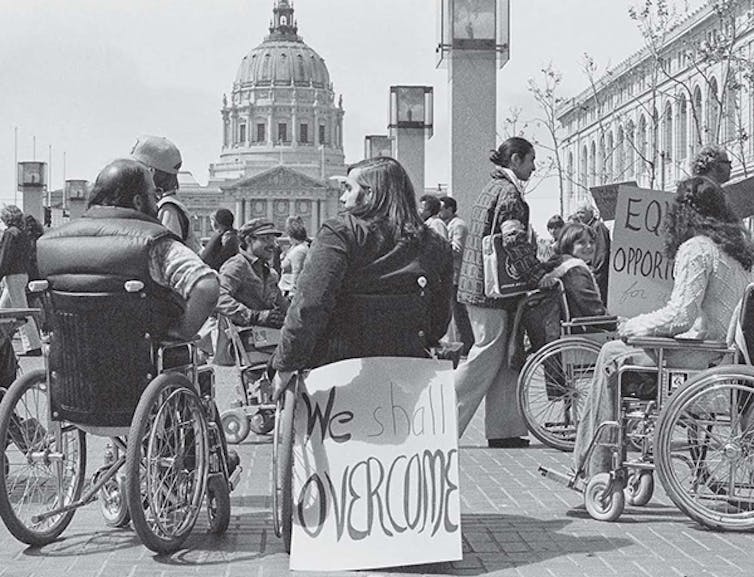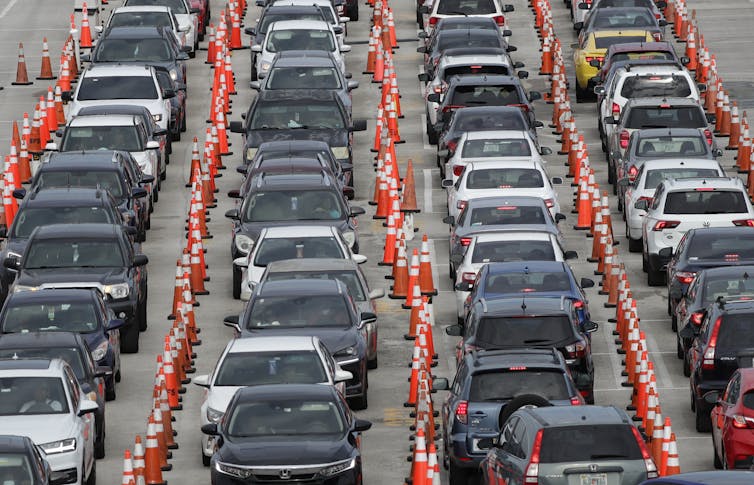The Americans with Disabilities Act at 30: A cause for celebration during COVID-19?
- Written by Joseph J. Fins, The E. William Davis Jr, M.D. Professor of Medical Ethics and Professor of Medicine at Weill Cornell Medicine, Cornell University
When President George Herbert Walker Bush signed the Americans with Disabilities Act[1] (ADA[2]) into law on July 26, 1990, we doubt he was thinking about protecting people with disabilities during a pandemic. How could he? It was unimaginable to conjure up the catastrophe wrought by the coronavirus. We can excuse that oversight.
But Congress should have known better. Of the US$3 trillion dollars appropriated in the CARES Act[3] in response to COVID-19 pandemic, less than $1 billion[4] was dispersed to the states to support older people and individuals with disabilities. This neglect of people with disabilities vitiates the ADA on the cusp of its 30th anniversary.
But advocacy from the disability rights community has had a marginal effect. The Democratic House version[5] of the HEROES Act now being debated in the Senate has done much better. It includes significant[6] funds to assist people with disabilities during the pandemic, earmarking $10 billion to $15 billion to pay for home and community based services for the next year. This Medicaid funding can help keep people with disabilities in their homes and out of congregate and institutional settings[7] where they are especially vulnerable to COVID-19.
The House version of the bill also helps to fund hazard pay and needed access to personal protective equipment for essential health care workers who support people with disabilities. And it offers $200 million in funding for housing and provisions for paid leave for family caregivers. It also provides $500 cash payments to dependent adults with disabilities – individuals who did not qualify for stimulus checks in the original CARES Act in March.
But all this remains aspirational. As of this writing it is doubtful that the Republican Senate version[8] will be as attentive to the needs of disabled Americans. Senate Republicans seek to slash the $3 trillion House bill by a third. Hopefully, the needs of people with disabilities will make the cut just as we commemorate the passage of the ADA.
No doubt this will be a weekend of celebrations lauding the ADA. And there is much to celebrate. Jon Meacham in his biography of the first President Bush[9] hailed the ADA as “the most sweeping civil rights measure in a generation.”
A central mandate of the ADA is to make the goods of society accessible to people with disabilities and overcome their segregation in civil society through reasonable accommodation that allows them to go to work, live with their neighbors, and avoid institutionalization.
But let’s not delude ourselves with historic sentimentality as disability law is placed under tremendous stress by the pandemic. It would be especially tragic, and run counter to the ADA, if the disabled community were returned to the shadows by COVID-19 either through neglect or inattention.
Disability rights are civil rights
 Protesters in San Francisco in 1977 express their opposition to the lack of implementation of Section 504 of the Rehabilitation Act.
Anthony Tusler
Protesters in San Francisco in 1977 express their opposition to the lack of implementation of Section 504 of the Rehabilitation Act.
Anthony Tusler
It is too easy to forget disability rights as the nation rightly addresses the legacy of structural racism prompted by the Black Life Matters movement. But to do so would be to ignore the deep intersections between racial and disability injustice. And it would fundamentally misread the legacy of the civil rights movement, one of whose many contributions – and derivatives – was disability rights.
The stories of civil and disability rights are intertwined. One historical anecdote speaks to the close linkage: Before the passage of the Rehabilitation of Act of 1973[10], a precursor of the ADA, Sen. Hubert Humphrey first tried to amend the Civil Rights Act of 1964[11] to ban discrimination against people with disabilities in federally funded programs. As the nation gains a deeper appreciation of civil rights, it is important to remember that disability rights are civil rights.
And they are not fair weather rights. In our view, the ADA must be operative in good and bad times. People with disabilities are especially vulnerable during the pandemic. They disproportionately live, or are at risk of living, in congregate settings where they can become tinder for the virus. And the everyday inconveniences of the pandemic suffered by folks without a disability are doubly challenging for people with a disability.
ADA compliance during COVID-19
 Lines of cars wait for a COVID-19 test in Miami Gardens, Florida. Drive-through testing sites can pose a challenge for people with disabilities.
AP Photo/Wilfredo Lee[12]
Lines of cars wait for a COVID-19 test in Miami Gardens, Florida. Drive-through testing sites can pose a challenge for people with disabilities.
AP Photo/Wilfredo Lee[12]
Those without disabilities complain about wearing a mask or being deprived of dinner at the neighborhood bistro. But people with disabilities have more formidable challenges. Just imagine you’re disabled and need to get a COVID-19 test. Your state has set up a drive-through testing center. The problem is you can’t drive or are unable to sit in a car for several hours to wait for the test.
Disability Rights Nebraska[13] has filed a complaint with the U.S. Department of Health and Human Services about TestNebraska, the state’s COVID-19 mobile testing program, claiming the program discriminated against people with disabilities. Nebraska Gov. Pete Ricketts essentially conceded the discrimination when he told Nebraska’s PBS and NPR[14] that “what we needed to do is to continue to work on getting the system down for the regular customers, so to speak, if you want to think about it – the drive-up customers that the system was originally designed to serve.”
What did Gov. Ricketts mean by regular customers? Are people with disabilities somehow irregular and unworthy? Invoking a Rawlsian theory of justice[15], not to mention the mandates of the ADA, shouldn’t people with the greatest need be who the state prioritizes?
In a letter to Roger Severino[16], the director of the HSS Office of Civil Rights, Disability Rights Nebraska cites one responsible citizen with a disability who had trouble getting tested. She had developed a sore throat, fatigue, nausea and muscle aches, all potential signs of COVID-19. She lived at home and depended upon a ventilator. Her doctor told her to go to the drive-through testing site. But she was unable to drive there safely by herself and was worried that she might expose someone else if they drove her to the site. Her doctor told her to wait and see how things went and call an ambulance if she needed to go to the emergency room. Clearly this barrier to care is a violation of the letter and spirit of the Americans with Disability Act and cannot stand.
The endless lines of cars[17] snaking through parking lots in Florida, Arizona and Texas waiting for COVID-19 testing reminds us of the final scene from “A Field of Dreams[18].” The headlights stretch out into the Iowa twilight affirming that if you build it they will come. But in the context of COVID-19 that’s not enough. You need to build it so that everyone can come. This means accommodating all who are currently living with disabilities and the newly disabled survivors of COVID-19[19] who will be left with lifelong challenges. As we celebrate every life that is saved, we need to remember that those lives deserved to be lived[20].
As the nation celebrates the 30th anniversary of the ADA, this law is more important than ever. Congress must include adequate funds in the forthcoming HEROES Act to ensure ADA compliance during the pandemic. Anything less turns any celebration into a hollow bromide.
References
- ^ George Herbert Walker Bush signed the Americans with Disabilities Act (www.npr.org)
- ^ ADA (www.ada.gov)
- ^ CARES Act (home.treasury.gov)
- ^ less than $1 billion (www.hhs.gov)
- ^ House version (edlabor.house.gov)
- ^ significant (www.disabilityscoop.com)
- ^ congregate and institutional settings (www.cdc.gov)
- ^ Senate version (www.nbcnews.com)
- ^ biography of the first President Bush (www.penguinrandomhouse.com)
- ^ Rehabilitation of Act of 1973 (www.access-board.gov)
- ^ Sen. Hubert Humphrey first tried to amend the Civil Rights Act of 1964 (mn.gov)
- ^ AP Photo/Wilfredo Lee (www.apimages.com)
- ^ Disability Rights Nebraska (www.disabilityrightsnebraska.org)
- ^ told Nebraska’s PBS and NPR (netnebraska.org)
- ^ Rawlsian theory of justice (www.csus.edu)
- ^ letter to Roger Severino (www.disabilityrightsnebraska.org)
- ^ endless lines of cars (www.washingtonpost.com)
- ^ A Field of Dreams (en.wikipedia.org)
- ^ newly disabled survivors of COVID-19 (pubmed.ncbi.nlm.nih.gov)
- ^ those lives deserved to be lived (fedace.org)
Authors: Joseph J. Fins, The E. William Davis Jr, M.D. Professor of Medical Ethics and Professor of Medicine at Weill Cornell Medicine, Cornell University

